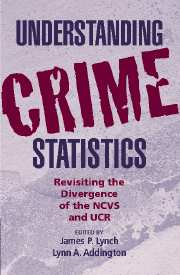Book contents
- Frontmatter
- Contents
- Acknowledgments
- Contributor Biographies
- INTRODUCTION
- OVERVIEW OF THE TWO NATIONAL MEASURES OF U.S. CRIME
- DEFINING DIVERGENCE AND CONVERGENCE
- SOURCES OF DIVERGENCE IN THE NCVS
- SOURCES OF DIVERGENCE IN THE UCR
- 8 Using NIBRS to Study Methodological Sources of Divergence Between the UCR and NCVS
- 9 Explaining the Divergence Between UCR and NCVS Aggravated Assault Trends
- 10 Missing UCR Data and Divergence of the NCVS and UCR Trends
- CONCLUSION
- Index
- CAMBRIDGE STUDIES IN CRIMINOLOGY
- References
10 - Missing UCR Data and Divergence of the NCVS and UCR Trends
Published online by Cambridge University Press: 23 December 2009
- Frontmatter
- Contents
- Acknowledgments
- Contributor Biographies
- INTRODUCTION
- OVERVIEW OF THE TWO NATIONAL MEASURES OF U.S. CRIME
- DEFINING DIVERGENCE AND CONVERGENCE
- SOURCES OF DIVERGENCE IN THE NCVS
- SOURCES OF DIVERGENCE IN THE UCR
- 8 Using NIBRS to Study Methodological Sources of Divergence Between the UCR and NCVS
- 9 Explaining the Divergence Between UCR and NCVS Aggravated Assault Trends
- 10 Missing UCR Data and Divergence of the NCVS and UCR Trends
- CONCLUSION
- Index
- CAMBRIDGE STUDIES IN CRIMINOLOGY
- References
Summary
INTRODUCTION
The National Crime Survey (NCS, now the National Crime Victimization Survey, or NCVS) was originally designed to provide a check against the crime statistics voluntarily provided to the FBI's Uniform Crime Reporting (UCR) Program by police departments (President's Commission, 1967, p. 21). Pilot surveys (Biderman et al., 1967; Ennis, 1967) had confirmed the widespread belief that many crimes are not reported to the police, the so-called “dark figure” of crime, so a survey would provide information about the nature and extent of unreported crime. Because the survey – which gathers data directly from household residents concerning victimizations they may have experienced over the past six months – provides a more direct check on the true amount of crime, it is considered superior to the UCR for this purpose.
There are also reasons that the UCR may be considered superior to the NCVS. After all, the UCR is a complete count of crimes reported to the police, whereas the NCVS is based on a sample of crimes recalled by citizens aged 12 years and older, in 45,000 randomly selected households, which occurred within the past 6 months. A complete count has no sampling error, whereas the sampling error for the NCVS exists – and is growing as financial considerations dictate reductions in sample size. Moreover, the detailed nature of UCR reporting makes it possible to look at specific time patterns (hour of day, day of week or month) and places where crime is occurring, a specificity that is not available using the NCVS.
- Type
- Chapter
- Information
- Understanding Crime StatisticsRevisiting the Divergence of the NCVS and the UCR, pp. 269 - 294Publisher: Cambridge University PressPrint publication year: 2006
References
- 3
- Cited by

